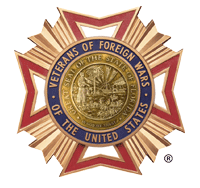
VFW HISTORY
The Veterans of Foreign Wars (VFW) is a U.S. organization comprised of men who have served overseas in the military during Word War I, World War II, the Korean war, the Vietnam War, and the Persian Gulf War. Veterans who served in expeditionary campaigns such as Grenada and Panama are also eligible to join. Female relatives of veterans and women who have served overseas in the armed forces are eligible to join the Ladies Auxiliary. In 2003 the VFW, with its Auxiliary, had about 2.7 million members in approximately 6,500 posts worldwide. The organization's national head-quarters are located in Kansas City, Missouri, but it also has a large office in Washington, D.C.
The VFW was established in 1913, consolidating three organizations created by Spanish-American War veterans. From its inception, the VFW has sought to promote patriotism and national security. Its paramount mission, however, has been ensuring that needy and disabled veterans receive aid. Beginning in 1922, it has sold a paper flower called the "Buddy Poppy," to raise funds for national service programs and relief for needy veterans and their families. The VFW fought for military pensions after World War I, planned the establishment of the Veterans Administration (VA) in 1930, lobbied for the GI Bill of Rights after World War II, and helped develop the national cemetery system for veterans. The VFW has also contributed millions of dollars to cancer research since the 1950s.
The VFW National Legislative Service office in Washington, D.C., monitors legislation that affects veterans. It alerts the membership to key legislation and lobbies Congress and the executive branch on veterans' issues. The office often assists congressional staffs in preparing legislation. In the early 2000s, the VFW legislative goals included a VA budget with sufficient funds to provide adequate veterans health care, vocational training and retraining for veterans, and employment opportunities for veterans.
The VFW has almost 16,000 trained service officers to assist veterans and their dependents in gaining federal or state entitlements. These service officers help with military discharge upgrades, records correction, education benefits, disability compensation, pension eligibility, and other types of veterans' issues. Field representatives conduct regular inspections of VA health care facilities, regional VA offices, and national cemeteries.
Historically, the VFW has promoted patriotism through its "Americanism Program." It provides materials and information and sponsors events and activities that are designed to stimulate interest in U.S. history, traditions, and institutions. The "Voice of Democracy" program is a national essay competition that annually provides more than $2.5 million in college scholar-ships and incentives.
"Veterans of Foreign Wars." West's Encyclopedia of American Law. 2005. Retrieved April 13, 2016 from Encyclopedia.com
The Veterans of Foreign Wars (VFW) is a U.S. organization comprised of men who have served overseas in the military during Word War I, World War II, the Korean war, the Vietnam War, and the Persian Gulf War. Veterans who served in expeditionary campaigns such as Grenada and Panama are also eligible to join. Female relatives of veterans and women who have served overseas in the armed forces are eligible to join the Ladies Auxiliary. In 2003 the VFW, with its Auxiliary, had about 2.7 million members in approximately 6,500 posts worldwide. The organization's national head-quarters are located in Kansas City, Missouri, but it also has a large office in Washington, D.C.
The VFW was established in 1913, consolidating three organizations created by Spanish-American War veterans. From its inception, the VFW has sought to promote patriotism and national security. Its paramount mission, however, has been ensuring that needy and disabled veterans receive aid. Beginning in 1922, it has sold a paper flower called the "Buddy Poppy," to raise funds for national service programs and relief for needy veterans and their families. The VFW fought for military pensions after World War I, planned the establishment of the Veterans Administration (VA) in 1930, lobbied for the GI Bill of Rights after World War II, and helped develop the national cemetery system for veterans. The VFW has also contributed millions of dollars to cancer research since the 1950s.
The VFW National Legislative Service office in Washington, D.C., monitors legislation that affects veterans. It alerts the membership to key legislation and lobbies Congress and the executive branch on veterans' issues. The office often assists congressional staffs in preparing legislation. In the early 2000s, the VFW legislative goals included a VA budget with sufficient funds to provide adequate veterans health care, vocational training and retraining for veterans, and employment opportunities for veterans.
The VFW has almost 16,000 trained service officers to assist veterans and their dependents in gaining federal or state entitlements. These service officers help with military discharge upgrades, records correction, education benefits, disability compensation, pension eligibility, and other types of veterans' issues. Field representatives conduct regular inspections of VA health care facilities, regional VA offices, and national cemeteries.
Historically, the VFW has promoted patriotism through its "Americanism Program." It provides materials and information and sponsors events and activities that are designed to stimulate interest in U.S. history, traditions, and institutions. The "Voice of Democracy" program is a national essay competition that annually provides more than $2.5 million in college scholar-ships and incentives.
"Veterans of Foreign Wars." West's Encyclopedia of American Law. 2005. Retrieved April 13, 2016 from Encyclopedia.com